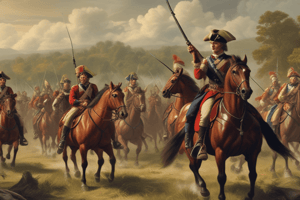Podcast
Questions and Answers
What was the primary cause of the French and Indian War?
What was the primary cause of the French and Indian War?
- Disagreements over trade routes with Native American tribes
- Religious conflicts between the French and British settlers
- Competition for control of Caribbean colonies
- Territorial disputes between British settlers and French explorers in the Ohio River Valley (correct)
Which explorer established early French claims in the disputed area of the Ohio River Valley?
Which explorer established early French claims in the disputed area of the Ohio River Valley?
- Christopher Columbus
- Vasco da Gama
- René-Robert Cavelier, sieur de La Salle (correct)
- John Cabot
What was a key outcome of the French and Indian War for Britain?
What was a key outcome of the French and Indian War for Britain?
- Isolation from European affairs
- Establishment of a new colony in Africa
- Loss of all its colonies to France
- Acquisition of French territories in North America (correct)
How did the French and Indian War impact the relationship between Britain and its colonists?
How did the French and Indian War impact the relationship between Britain and its colonists?
What was the significance of the Treaty of Paris 1763 in relation to the French and Indian War?
What was the significance of the Treaty of Paris 1763 in relation to the French and Indian War?
How did the French and Indian War impact the future of the North American continent?
How did the French and Indian War impact the future of the North American continent?
What was a key factor that contributed to the growing tensions between Britain and its American colonies after the French and Indian War?
What was a key factor that contributed to the growing tensions between Britain and its American colonies after the French and Indian War?
Which battle marked an early French success in the French and Indian War?
Which battle marked an early French success in the French and Indian War?
What was a consequence of the Treaty of Paris in 1763, which ended the French and Indian War?
What was a consequence of the Treaty of Paris in 1763, which ended the French and Indian War?
How did the French and Indian War contribute to the growing divide between Britain and its American colonies?
How did the French and Indian War contribute to the growing divide between Britain and its American colonies?
What was a key difference in perspective between King George III and the American colonists regarding the war expenses?
What was a key difference in perspective between King George III and the American colonists regarding the war expenses?
What was a significant outcome of the French and Indian War that laid the groundwork for the American Revolution?
What was a significant outcome of the French and Indian War that laid the groundwork for the American Revolution?
Flashcards are hidden until you start studying
Study Notes
French and Indian War
Introduction
The French and Indian War, also known as the Seven Years' War in Europe, was a crucial event in American history from 1754 to 1763. This conflict was primarily fought between France and Great Britain over control of the North American continent, but it also involved Native Americans and other European powers. The war had far-reaching implications for both Europe and the Americas, shaping the future of the continent and driving a wedge between Britain and its colonists.
Causes of the War
The French and Indian War began due to territorial disputes between British settlers and French explorers and traders in the Ohio River Valley. The issue revolved around whether the upper Ohio River valley belonged to England or France. Behind this specific dispute lay a larger question: which national culture would dominate the heart of North America. The settlers of English extraction were predominant in the contested area, but the French had established early claims through exploration and alliances with Native Americans. British territorial claims rested on explorations by John Cabot and later royal charters, while French claims were based on René-Robert Cavelier, sieur de la Salle's expeditions. For about 60 years, the conflict remained unresolved until it erupted into open hostilities.
Key Battles
The war saw several significant battles, including the Battle of Fort Duquesne in 1754, where young George Washington assumed command after an initial failure to warn the French about encroachment onto Virginia land. He built Fort Necessity near Pittsburgh, but was eventually forced to surrender when outnumbered by the French forces. Despite these early French successes, the tide turned in favor of the British in subsequent years, culminating in the capture of Montreal in 1760.
Treaty of Paris 1763
The war ended formally with the signing of the Treaty of Paris on February 10, 1763. The treaty granted Britain Canada and all of France’s claims east of the Mississippi River, effectively ending New France. The British gained control of Florida from Spain in exchange for returning Havana to the Spanish. The inhabitants of the British colonies rejoiced upon hearing the news, as they had long feared the influence of the French and their Native American allies to the north and west.
Impact on Colonists
The consequences of the French and Indian War impacted the relationship between Britain and her colonists more significantly than any previous event. As the Seven Years' War wore down the combatants, Britain faced the challenge of paying off her national debt, which nearly doubled during the war. To cover these costs, taxes were imposed on necessities like tea, molasses, paper products, etc., which were viewed as everyday items by the colonists. They felt that they should not have to pay for the debts accrued by events in which they had no direct participation. King George III, on the other hand, saw them as partners in the empire rather than subjects who could bear these financial burdens.
Legacy of the War
The French and Indian War laid the groundwork for the American Revolution. Disputes over frontier policy and payment of war expenses led to colonial dissatisfaction. Additionally, the war encouraged British expansion westward beyond the Appalachians, leading to conflicts with Native Americans over territory and resources. These issues contributed to the growing divide between Britain and its American colonies.
Studying That Suits You
Use AI to generate personalized quizzes and flashcards to suit your learning preferences.




